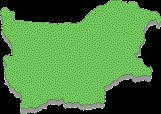|
Preslav town |
|
||||||
| This
town lying next to Golyama Kamchiya river, 19 km south-west of Shoumen.
Population of 10000. Terminal station on a detour from Han Kroum station
on the railway line Sofia-Varna. In the outskirts there are settlements
dating back to the Neolithic, Eneolithic and Bronze Age, ruins of a
Thracian fortress in Kamuka country, remains of Proto-Bulgarian shrines.
South of the present day town one will find the national archaeological reserve Veliki Preslav - the second Bulgarian capital, founded by tsar Simeon as a political, economical and cultural center, related to the efflorescence of the First Bulgarian Kingdom. The town develops around an older fortified palace and its building, according to the legend, lasts 28 years. Moving the capital from Pliska is brought about by the affiliation of Bulgaria to Christian religion and culture, though the construction traditions of Pliska are preserved - the laying out, the grandeur, the separation of an Outer and Inner town with a palace compound. Outsiders had access only to the official part of the palace. King's cambers, servants quarters, farm buildings are surrounded by a high wall. There stood the open-air bath with a swimming pool, water being heated by a floor installation like the one in Pliska. Monasteries around the capital were religious and scholarly centers - here and also in the palace bookmen of the Preslav school worked. Among the numerous churches, most remarkable is the Golden church, built in 907, which is the only uncovered cult edifice in Bulgarian architecture. In Veliki Preslav artistic crafts related to building and construction developed. Buildings had sculpture decoration of cornices, marble capitals, lining tiles, related to the so-called Preslav painted ceramics. The subordination of the independent Bulgarian state led to the decline of Veliki Preslav, which in 13 c. remains only as a bishop's seat, in 1388 is destroyed by Ottoman invaders and as early as 17 c. is in ruins. Archaeological excavations were started at the beginning of our century by Czech archaeologist Karel Shkorpil, Russian Byzantologist Fyodor Ouspenskii and numerous Bulgarian archaeologists till the present day. A museum. |
|||||||
|
|
|||||||
